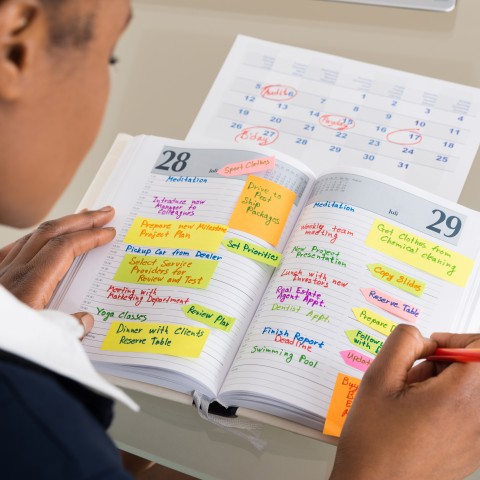
Once you’ve mastered the beginner level of Polish, you can start learning useful intermediate Polish phrases. The benefit of learning entire phrases instead of just words is that you’ll become familiar with the natural patterns of speaking. This is important because, as an inexperienced learner, you run the risk of putting words together in a way that a native speaker never would.
But what is an intermediate level, and how can you know you’re already there? The intermediate stage is where you’re comfortable with all of the necessary “beginner” things but are not yet fluent in the language. You can speak the language enough to get around, but you often don’t have the right vocabulary or make frequent mistakes.
There are many Polish phrases at the intermediate level that you should learn, but we recommend you start with the most handy ones. In this blog post, you’ll find out how to talk about past events, make and change plans, explain and list reasons, and much more.
 Table of Contents
Table of Contents
- Talking About Past Events
- Making and Changing Plans
- Explaining and Listing Reasons
- Making Recommendations and Complaints
- Reacting to Everyday Situations
- Etiquette Phrases in Social and Business Settings
- Final Thoughts
1. Talking About Past Events

Being able to talk about past events is important when you’re talking with your friends and colleagues. In everyday conversations, it’s common for people to ask about how someone spent their weekend, holiday, or another notable day such as a religious or national celebration.
Here are some useful Polish phrases for intermediate students that you can use to talk about past events:
- Świetnie się bawiliśmy. – “We had a great time.”
- Tańczyliśmy do białego rana. – “We danced until early in the morning.”
- To było niesamowite doświadczenie! – “It was an amazing experience!”
- Bardzo się wtedy bałam/bałem. – “I was really scared then.”
- The first form is feminine, and the second is masculine.
- To był najlepszy/najgorszy dzień w moim życiu. – “It was the best/worst day of my life.”
- Kiedyś lubiłam/lubiłem czytać powieści romantyczne. – “I used to like reading romance novels.”
- The first form is feminine, and the second is masculine.
- Wypoczęliśmy na urlopie. – “We relaxed during our holiday.”
- To bardzo bolało. – “It hurt a lot.”
What else could you talk about? Well, maybe about how you spent your last vacation or holiday! In Poland, for example, the first day of spring is a pretty big deal and often creates fond memories. Remember to take every opportunity to practice Polish by telling people about your experiences and asking them about theirs. It’s by speaking in real-life circumstances that you’ll improve your language skills.
2. Making and Changing Plans

In business and social contexts alike, we all need to make—and sometimes even change—plans. Being able to suggest getting a beer or coffee with someone (and understanding when others ask us the same) is an important social skill.
Here are some useful intermediate Polish phrases for such situations:
- Masz czas w ten weekend? – “Do you have time this weekend?”
- Masz ochotę na pizzę/piwo? – “Fancy a pizza/beer?”
- Czy mogę kogoś ze sobą przyprowadzić? – “Can I bring someone with me?”
- Możemy przełożyć nasze plany? – “Could we postpone our plans?”
- Przepraszam, ale jutro jednak nie mogę. – “I’m sorry, but I can’t make it tomorrow, after all.”
- Umówmy się na wtorek. – “Let’s meet up on Tuesday.”
As we stated above, being able to make plans is a key social skill. That’s why we have numerous lessons on this topic. Would you like some words and expressions to complement the intermediate Polish phrases you just saw? We recommend starting with these lessons:
3. Explaining and Listing Reasons

At this stage in your Polish studies, it’s equally important to learn how to explain and list reasons for doing (or not doing) something. This would come in handy, for example, in situations where someone was angry with you or where you had to explain a plan of action.
Here are some relevant Polish phrases for intermediate-level students:
- Zrobiłam/Zrobiłam to, ponieważ…
“I did it because…”
[The first form is feminine, and the second is masculine.]
Zrobiłam/Zrobiłam to, ponieważ tak wypada.
“I did it because it’s what’s expected.”
Zrobiłam/Zrobiłam to, ponieważ nie miałam wyjścia.
“I did it because I had no choice.”
- Myślę, że tak powinnam/powinienem postąpić. To dlatego…
“I believe this is the right thing to do. That’s why…”
[The first form is feminine, and the second is masculine.]
Myślę, że tak powinnam/powinienem postąpić. To dlatego z wami rozmawiam.
“I believe this is the right thing to do. That’s why we’re having this conversation.”
Myślę, że tak powinnam/powinienem postąpić. To dlatego zainwestuję pieniędze.
“I believe this is the right thing to do. That’s why I’ll invest my money.”
- Mam ku temu trzy powody. Po pierwsze… po drugie… po trzecie…
“I do it for three reasons. First of all… Secondly… Last but not least…”
Mam ku temu trzy powody. Po pierwsze to dobra inwestycja, po drugie pomogę społeczności, po trzecie to nowe miejsce pracy.
“I do it for three reasons. First of all, it’s a good investment. Secondly, I’ll help the community. Last but not least, it’ll create job opportunities.”
Mam ku temu trzy powody. Po pierwsze to dobry uczynek, po drugie nic mnie to nie kosztuje, po trzecie to komuś pomoże.
“I do it for three reasons. First of all, it’s a good deed. Secondly, it costs me nothing. Last but not least, it’ll help someone.”
- To dobry pomysł, bo…
“It’s a good idea because…”
To dobry pomysł, bo zwiększy produktywność.
“It’s a good idea because it’ll increase productivity.”
To dobry pomysł, bo tak jest szybciej.
“It’s a good idea because it’s faster that way.”
- To nie ma sensu, dlatego że…
“It makes no sense because…”
To nie ma sensu, dlatego że szef nigdy się nie zgodzi.
“It makes no sense because there’s no way that the CEO will agree.”
To nie ma sensu, dlatego że ludzie tego nie kupią.
“It makes no sense because people won’t buy it. ”
You should also check out our lesson on giving reasons in Polish using żeby and bo. If your motivation to learn Polish gets low at any point, remember that you can get it back with our lesson on the top five reasons to study Polish.
4. Making Recommendations and Complaints

Other essential intermediate Polish phrases are those used for making recommendations or complaints. Here are just a few to get you started:
- Powinieneś/Powinnaś tego spróbować! – “You should try this.”
- To najlepsza/najlepszy/najlepsze [food], jaki jadłem/jadłam. – “It’s the best [food] I’ve ever eaten.”
The first form of the verb jeść is feminine, and the second is masculine. The word najlepszy is in the feminine, masculine, and neuter forms, respectively. - To najlepsza/najlepszy/najlepsze [drink], jaki piłam/piłem. – “It’s the best [drink] I’ve ever drunk.”
The first form of the verb pić is feminine, and the second is masculine. The word najlepszy is in the feminine, masculine, and neuter forms, respectively. - Bardzo nam się tam podobało. – “We really liked it there.”
- Na pewno tam wrócimy. – “We’ll definitely come back.”
- Zła obsługa klienta. – “Bad customer service.”
- Niedobre jedzenie. – “Bad food.”
- Nie polecam. – “I don’t recommend it.”
- Odradzam wizytę. – “I discourage you from visiting.”
You should also check out our other lessons on complaining:
Complaining is important when it’s called for. However, it can be easy to overdo it! If you feel you complain too much, you may want to consider implementing some tips on how to complain less and be happier.
5. Reacting to Everyday Situations

Being able to react to certain situations like a native speaker is another important skill. Here are some useful intermediate Polish phrases to help you express your amazement or disappointment:
- Super! / Ekstra! / Rewelacja! – “Awesome!”
- Serio? / Naprawdę? / No co ty? – “Really?”
- Nie żartuj! / Nie rób sobie jaj! / Bez jaj! – “You can’t be serious!”
The first phrase is the most neutral one. The other two could be considered slightly vulgar by some people. - O matko! / O jezu! – “Oh my goodness!”
Some people could consider the second form sacrilegious, even though it’s commonly used. - Łał! – “Wow!”
Are you surprised to see this one on the list? Anglicisms in Polish are quite common. These are words borrowed from English and used in Polish, sometimes modified and sometimes not.
- To jest naprawdę super / ekstra / fajne! – “It’s really cool!”
- Żałuję, że mnie tam nie było. – “I regret not being there.”
- Masakra! / Koszmar! / Daj spokój! – “What a nightmare!”
It’s also important to know how to use such phrases in real life. A good idea is to just listen and try to pick up on what sort of phrases the Polish people around you use. Don’t have any Polish friends? No problem! Try watching series or movies!
Here’s a sample dialogue showing you how you might use the phrases provided above:
A: Świetnie się bawiliśmy. – “We had a great time.”
B: Super! Żałuję, że mnie tam nie było. – “Great! I regret not being there.”
6. Etiquette Phrases in Social and Business Settings

Politeness is extremely important across languages and cultures. In order not to offend anyone, you have to know the basic rules of wherever you are. Here are some polite Polish phrases for intermediate students:
- Smacznego! – “Bon appétit.”
- Witamy! – “Welcome!”
- Czy chciałabyś/chciałbyś coś do picia/jedzenia? – “Would you like something to drink/eat?”
The first form of the verb chcieć is feminine, and the second is masculine. - Czuj się jak u siebie w domu. / Rozgość się. – “Please make yourself at home.”
- Masz jakieś pytania? – “Do you have any questions?”
- Czy mogę jakoś pomóc? – “Can I help you?”
- Nie mogę się doczekać! – “I can’t wait!”
- Spokojnej podróży! – “Have a safe trip!”
- Udanych wakacji! – “Have a good holiday!”
Another important thing you should be able to do in Polish is refuse politely. We’re all allowed to have our preferences, but a simple “no” (nie) is as rude in Poland as anywhere else.
Having said that, there are certain cultural differences between politeness in Polish and English. Sometimes good manners may be lost in translation, so try to consider the context before getting offended.
7. Final Thoughts
Learning a language is a long journey, and memorizing Polish phrases at the intermediate level can definitely help you along the way. You just need to practice real-life conversations using the phrases we introduced today, and you’ll quickly notice an improvement in your speaking and listening skills.
Which of these intermediate phrases in Polish are you looking forward to using the most? Perhaps there’s one you’ve already heard? Let us know in the comments!
Unfortunately, no matter how handy or commonly used certain phrases are, they’re not enough on their own. To truly learn a language, you need to practice your speaking, reading, writing, and listening skills. You should also be patient; your understanding of Polish won’t improve overnight. The best way to improve your Polish is to use a tool designed specifically for language learning.
Fortunately, there’s PolishPod101, a platform where you can get a lot of exposure to how the Polish language is spoken. It’s full of video and audio recordings of native Polish speakers, and you’ll also find many other functionalities to help you learn the language. Explore our different subscription plans and create your free lifetime account with PolishPod101 today.










